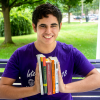In Spanish, I write.
It was a Sunday morning when I got my first novel. I was wandering in the bookstore with my parents, looking for styrofoam for a first-grade project, when something caught my attention: a stack of books with illustrations on the front. I immediately pulled my mother’s hand, refusing to move on. I had watched “The Lion, the Witch, and the Wardrobe” a month before — suddenly my eyes sparkled; all the Narnia books were there on the shelf. “The Magician’s Nephew” fell into my hands. My voice switched into a softer tone; the same one I used to get what I want. A few minutes later, my parents were fed up with my tantrum; they decided to buy me the book.
I was amazed by the form of the pages. They had very few pictures in them. At first, I could not understand why they were not there, but I began imagining my world as if it were Narnia’s tales. It took me almost three weeks to finish the book. Every day I would sit for hours looking at the words that began making sense as the story unraveled. Narnia’s world became my own.
In dreams, my friends became the characters, and I decided to write my story. I pulled tens of sheets of paper from the printer and drew the cover of my book. “La Puerta” (The Door) was the name. A few sentences marked the beginning. The story never had an end, but I began to wonder if words could create a magical universe.
This experience sparked my love of reading, but writing creatively and outside the academic setting never crossed my mind until my senior year of high school. Writing college application essays made me rediscover a passion I had left on those stapled sheets that had vanished while moving out of our house into a smaller apartment years earlier.
While learning English and writing the essay, I struggled to put into words the refranes, or expressions, that better represented my thoughts. Echarle pichón, or “give it little birds,” which meant to push on, was my life motto. I spent nights desvelado, or “unveiled,” meaning not getting any sleep, knowing that camarón que se duerme se lo lleva la corriente — “the shrimp that falls asleep is taken away by the current,” or, in other words, work hard or the circumstances will overwhelm you.
The same thing happened to me when I went back to Venezuela after a year and a half in the U.S. Some words in English came to my mind as I spoke. I had discovered two methods of thinking and finding different ways to describe what is in front of me. Since arriving at Kenyon, creative thinking and the power of words have expanded my worldview and thinking.
Besides the strong English and political philosophy classes, A Medio Camino (On Middle Path), the Spanish newspaper(staff photo above), has allowed me to connect with those refranes and words from my culture while engaging with topics that relate to me. As the chief editor of community outreach, I have been able to write articles about the current situation in Venezuela and poems for the creative writing section, and helped Spanish learners express themselves through their texts and reach their full potential in the language.
Since its foundation a year and a half ago, A Medio Camino has become an outlet for Spanish-speaking students to connect with stories from a different perspective in a time when there is a growing Latin American population both at Kenyon and in the U.S. Many students who are in the organization have connected to their heritage or learned about issues that affect minorities in this country. AMC has given a voice in Spanish to campus and created a safe space to reflect upon literature, structures of power, political issues and culture.
A Medio Camino gives me an environment to think in Spanish and write pieces that sometimes express better who I am. I now write creatively for hours, both in class and outside of it, inspired by the world I discovered in first grade: the one of magic in words; now in Spanish and English.
